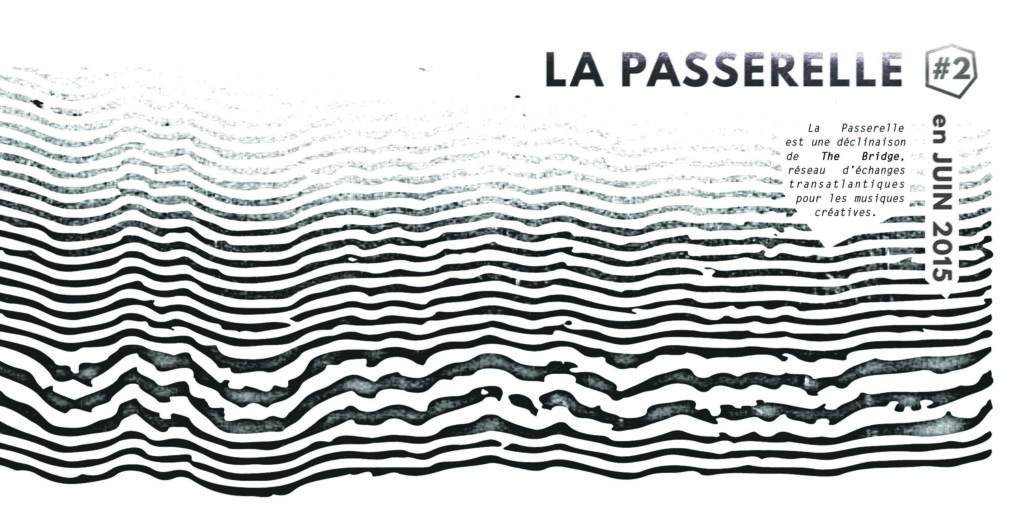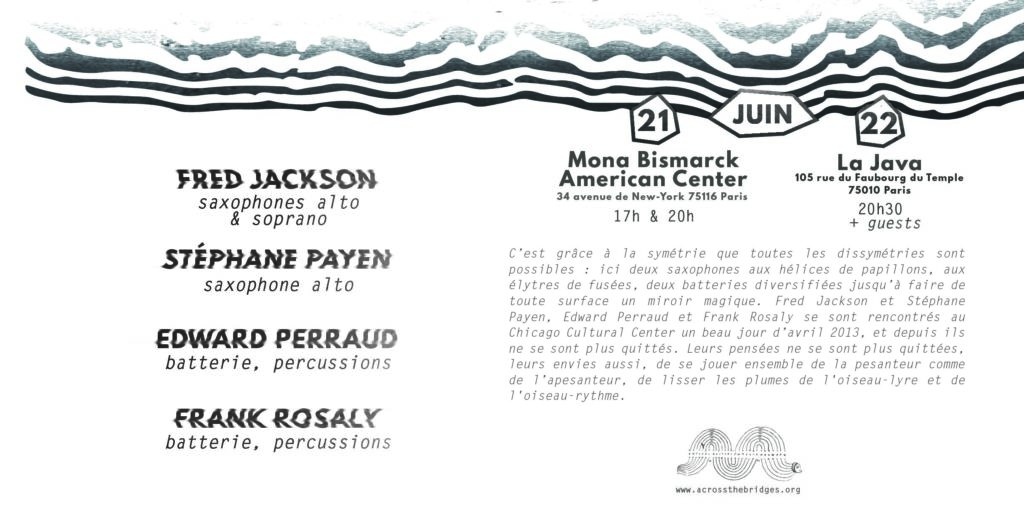Symmetry makes all kinds of disymmetries possible: in this case, two saxophones with butterfly helices and rocket elytra, and two drums diversified to the point of turning any surface into magical mirrors. Fred Jackson and Stéphane Payen, Edward Perraud and Frank Rosaly met at the Chicago Cultural Center one fine day in April 2013, and they’ve been together ever since. Their thoughts have never left each other, nor their desires, to play together with gravity and weightlessness, this time in Paris.
Saturday, June 21, 2015, Mona Bismarck American Center
It’s thanks to symmetry that all asymmetries are possible (and vice versa): here two saxophones with butterfly propellers, rocket elytra, two drums diversified to the point of making magical mirrors of any surface. In the beginning, Fred Jackson and Stéphane Payen, Edward Perraud and Frank Rosaly met at the Chicago Cultural Center, one fine day in April 2013, for the North American launch of The Bridge. Since then, they’ve never left each other’s side, nor their thoughts, nor their desires, to play together with gravity and weightlessness – this time in France for the second Passerelle (which take place unexpectedly, by invitation, outside the four exploration trips organized each year by The Bridge).
And so it begins all over again, between the palaces of Tokyo and the Musée d’Art Moderne de la Ville de Paris, while the multitude marches across Europe against austerity policies, and in Athens invades a garden at night. Between the palaces, we talk about sabar in Senegal and Fred Anderson in Chicago (Fred Jackson was the last musician the tenor saxophonist programmed at the Velvet Lounge), about transmission and responsibility, about the circulation of souls. And we take a long breath. Because the first set, in the garden beyond the palaces, that of the Mona Bismarck American Center (recently taking over the mission of the American Center for Students and Artists which, on boulevard Raspail, was the center of gravity for US bohemian artists and activists, in exile or on holiday, after the Second World War), opens with a synchronized dive from the top of the cliff of saxophones and drums. But imagine divers slowed down by their somersaults and twists, as if these cascading figures in space would eventually stabilize, forming a whole scaffolding above a new depth, rather than the one below, which, incidentally, disappears. These voices, these winds, these beats, these rhythms are all equipped with hooks, suspending themselves from one another, sometimes even embedding themselves. As if falling bodies were a construction technique.
From then on, the divers were divided into two groups: sagittarius saxophonists and trapeze drummers, assisting or challenging each other in their respective tasks, from relay to relay. All the duets, all the quartets within the quartet (but very few solos or trios), all the figures, tocades and roulades, will pass through. First sagittarius Payen with trapeze artist Rosaly, then trapeze artist Perraud with sagittarius Jackson. It’s immediately obvious that their understanding (their ability to multiply) is based on benevolence, on the care they give each other, with as much exuberance as modesty, especially when they almost end their set with a dreamy cover of Lonely Woman by the recently deceased Ornette Coleman. By the second set, the drums have set up camp and welcome Jackson, then Payen. The latter are free to come and go, to reconnoitre: the stewardship follows, even if it means smuggling rhythms. The gears are shifted up and down, Jackson shines on a contracted blues, while Perraud plays with a cymbal absence. Please, Make Up Your Mind features an almost torpid Fred Jackson theme, devoid of emphasis. Night falls on the statuary garden. As he packs up, Edward Perraud reminds us, “I risk my skins almost every night.”
Sunday, June 22, 2015, La Java
For the Fête de la Musique the day before, Gunther Schuller had the bad idea of bowing out. Staring into space, we let Pierre-Henri Thiebaut set up his equipment, because “it’s better to wire than to botch” asserts the sound engineer who is also the planner of a maze of inputs and outputs. Meanwhile, Stéphane Payen drinks too much coffee, Fred Jackson applies himself to reading Building People, Edward Perraud finds angles for his photos, Frank Rosaly gobbles up a platter of cheeses. PH continues: “The advantage of being in couples is that you have less treble. That afternoon in the concert hall, the four men record six pieces for a forthcoming album. The first spontaneous composition lasts some twenty minutes. A stable base of breaths, with a lot of tact, Payen and Perraud rather centered, Jackson and Rosaly rather off-center, until the two drummers flinch. Sagittarians and trapeze artists become geometers in disproportion. Payen and Perraud’s jagged duet, off-center in their turn. The second, spontaneous, forty-minute composition lets the drums frolic, while the saxophones sew long, more or less piercing lines. Contradictory velocity from the drummers, driven mad by the saxophonists. We’re close to extinction. Perraud persists. Violas soften. We’re close to extinction.
For the concert, the four men retained the diamond formation, with the two saxophonists facing each other and the two drummers facing each other, with the audience surrounding them. Arithmetic and arrhythmia, breaks and shatters for the drummers, axes and crosshatching for the blowers, a sense of continuity and discontinuity. The former are profuse, the latter are propositional, but never insistent, sometimes silhouettes, sometimes spectres. And butterflies. They are eternally acquainted. After a brightened duet between Payen and Rosaly, Jackson makes moderate use of circular breathing, as if levitating. A listener in the audience commented: “This is music whose construction you don’t spontaneously understand, and your relationship with time is turned upside down…”. And since there are so many musician friends in the audience this evening, we organize a draw for the next set. In a first hat, the number of musicians (from 3 to 5 participants at a time); in a second hat, the names of almost all the musicians present (except Sylvain Cathala, who came without his instruments); in a third hat, the duration of their collective improvisation (from 3 to 10 minutes). On this particular night, there will be four associations of improvisers:
- Fred Jackson with Sylvain Kassap on clarinets, Philippe Lemoine on tenor saxophone and Paul Wacrenier on piano: 3 minutes of dazed, harmonic apprehensions;
- Frank Rosaly with Antonin Rayon on piano and Oliver Lété on bass: 7 minutes of assertions and insinuations;
- Stéphane Payen and Edward Perraud with Kassap and Denis Fournier on drums: 7 minutes of stretching and melting;
- Fred Jackson with Lété, John Niekrasz and Samuel Silvant on drums: 5 minutes of hard work and harnessing.
Monday, June 23, 2015, in the city and in great company
Edward Perraud, drummer for Ressources Humaines, has been saying it for 48 hours: “You have to know how to change skin at the right moment”. So we’re going to see if we’re in the right place, at bank headquarters for a hold-up, for example, to explore the possibilities of a misunderstanding, of unlikely mutual aid, while we wait for wealth to be definitively socialized. At first, it’s the demon de midi holding an alto saxophone that passes through the floors, corridors and passageways of an anthill of office workers. Even our escort needs a map to find his way, in addition to his badge and master key, to get through the “secure waiting area” and “restricted zone”. The stunned staff, looking up from the cannibal screen or dropping some heavy file, see or hear Stéphane Payen wandering around. Some complain that they are being prevented from working. “There’s another one in the atrium!” someone shouts. It’s Fred Jackson in the nave, hemming in the echoes, waiting for his alter ego. Later in the afternoon, during a masterclass, Payen explains to a few managers how to play together (possible they hear: how to work together). And that there are no rules, only customs and methods (possibly they mean deregulation). The same goes for the meeting between the entire quartet and a hundred or so financiers in the underground amphitheatre near the old vault, where Rosaly has the luxury of waiting while darning her leather jacket. What will those present deduce from these tales of joie de vivre, this exaltation of leaping into the unknown? It’s best to start again with Jackson and Rosaly running through the countryside, with Payen and Perraud supporting the assaults, then breaching, of the two saxophonists. Rosaly bumps his skins and metals without sticks or shoes, he mistakes his bass tom for a foghorn, while the saxophonists rattle the keys of their instruments. The four men, like children or cats, play with balls of sound; they play in slow motion, with dragging accents, they take their momentum and go everywhere better than with a badge. And if a crisp, airy solo from Jackson is too quickly relayed, Payen picks up the slack with a shrivelled riff to launch a final pass of two between the saxophonists shouldering each other in succession and the redeployed drummers. A ballad – “a ballad to take away”, says Perraud – and that’s it. A cocktail awaits us in an inner courtyard or gut. And even better, on rue de Lappe in the evening, for the general meeting of Bridge, where some twenty musicians crowd together as if in a pirate’s lair, all the more so as they drink Kraken rum.
Alexandre Pierrepont
















